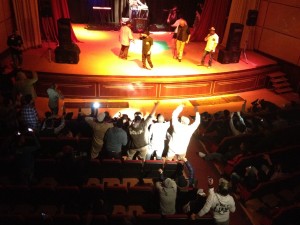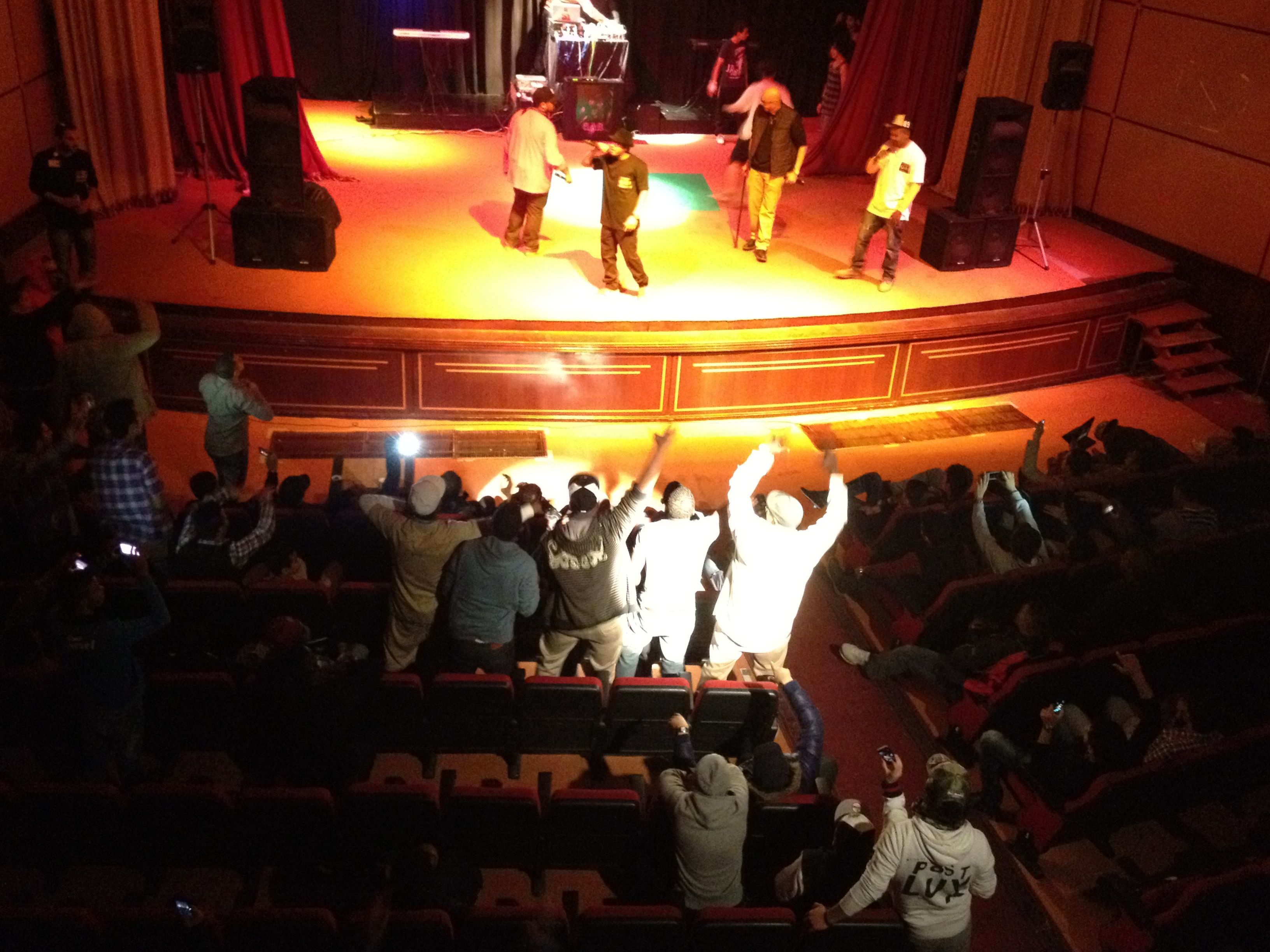By Valerie Stocker.

Tripoli, 22 December:
Spirits were high at the Scouts’ Theatre in Tripoli as local rappers and break-dancers showed off their . . .[restrict]talents to a small but enthusiastic audience on Friday afternoon.
The event’s headline act, Libyan rap ensemble GAB (Good Against Bad) showcased their new album, bringing several guest artists on the stage during their show.
These included local folk-pop singer and guitarist Fuad Gritli, rock ballad singer Hani Al-Kout and musicians such as Hanan, whose soulful tones contrasted sharply with the rougher rap vibes.
The evening kicked off with an lively break-dance routine by ensemble X-Boys, made up of a dozen or so youths, and ended with a song paying homage to traditional Libyan music.
Although this was their first public performance, GAB are by no means newcomers to the small but dynamic local rap scene. Members Ali G, Lutfi, Hamid Araiby (alias Brown Sugar) and Siraj first started out in 2006, making them pioneers of Libya’s rap scene.
All but one of the group are from Tripoli, but each brings their own special touch. While band manager Siraj draws from his Amazigh roots, Lutfi occasionally brings in French lyrics. Most of their songs, however, alternate between Arabic and English, the global language of hip-hop.
GAB said that they have several very different audiences that they are aiming at. American rap remains extremely popular among young people around the world, especially in Libya where the local music industry offers little variety.
But GAB don’t want to imitate their idols and musical influences in the States. For them, rap has to be relevant and meaningful, which requires some degree of local content. “Rap is about reality”, they said.
Fearing reprisal by the former regime, they used to refrain from politically sensitive topics, instead rapping about friendship, music and love. As other Libyan musicians, they began politicizing their music during the revolution.
In what is probably their best-known song, “Libya Bleed”, the chorus goes:
“Libya bleed, just like us/ Picture me being scared for my brothers who own the same blood as me/ Libya bleed, just like us/ Picture me being shook by the bloodbaths and the smell of death in my ‘hood/ Libya bleed, just like us/ Picture my daughter’s crying and her life’s in Qaddafi’s hands, while he’s just deciding.”
Like Tarhuni rapper Ibn Thabit’s song “Al-Su’al”, which came out at the very start of the uprising, “Libya bleed” became part of the “revolution soundtrack” that reflected the mood among young Libyans at the time: anger mixed with deep sorrow about the losses suffered among those who stood up against the regime.
Now that the barrier is broken, GAB want to continue addressing social and political issues of current concern. Among their latest songs, “What’s Next” talks about the challenges of rebuilding the country and their hopes for a better future.
Making music has been difficult for independent Libyan artists, not only because of censorship in the past, but also because the few local production companies usually stick to more conventional music styles and public funding is not readily available.
Although they hope this will change in the future, the band members know they do not expect much from the government in the near future, as it is facing more fundamental problems.
Friday’s concert was financed almost exclusively by the musicians and their friends. Clearly, organizing such an event is not just a financial, but also a logistical challenge. The concert took place under tight security, with Interior Ministry forces positioned in and around the Scouts’ Theatre.
“We were hoping to see some foreign diplomats in the audience and wanted to ensure adequate conditions”, Abderroauf, one of the sponsors, explained.
But the benefits of holding these events are well worth the effort, Abderraouf said. Young people here crave entertainment and the local music scene has a lot of potential.
“Unfortunately, society is still somewhat closed and skeptical of new trends”, he added.
This applies particularly to rap, which many consider inconsistent with tradition and moral values. But contrary to widespread perceptions, rap is not primarily about cursing and promoting violence. As seen during the Arab uprisings across the region, in which music played a significant role in expressing grievances and mobilizing the youth, rap has a social function that makes it unique to our times.
So far, the Internet has been GAB’s main distribution channel, but their latest album, recorded by the band’s own production company in Brown Sugar’s studio, is now available in Libyan music stores.
For now, their songs can still be downloaded from their official Facebook page (“G-A-B (Good Against Bad)”) and they have posted a number of music videos on YouTube, which, considering the lack of outside funding, are surprisingly professional.
The band is also planning more live performances, starting in January. With more promotion ahead of their next concert, the band can surely expect a much larger audience than on Friday. [/restrict]









